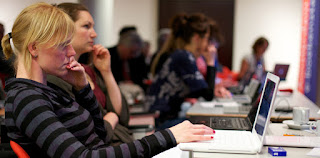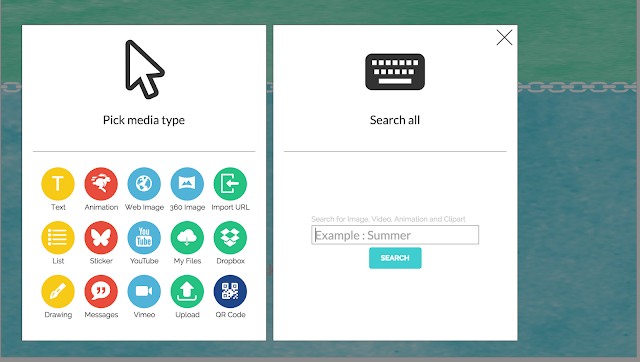What I've Learned From Special Education Teachers
Thank You Special Education Teachers!
Before I was a technology integrator, I worked in a 5th grade classroom along side a special education teacher every day. We had students in our classroom with every type of disability. Now that I have become a technology integrator, I continue to spend time with special education teachers in their classrooms. Probably because I have a comfort level with them and also because I know that I can learn a TON from watching these talented teachers work their instructional and classroom management magic.
I think any educator that is struggling with managing behaviors in their classroom, or with meeting the individual needs of each of their students, should spend some time learning from special education teachers.
Here are some of the most important take aways that I have learned from working with special education teachers.
#1 - Get to know your students well and find out what makes them "tick". When a student is challenging you or refusing to work or participate, take time to have a conversation with them and find out what matters to them. Conversations with a student in a non-judgmental way can build a trust and rapport that will go a long way in the educational setting.
#2 - Keep things to "Yes or No" - there are no grey areas. One technique that I learned from my friend Stacey, was to ask students yes or no questions when having conversations with them. If a student is caught misbehaving, Stacey would simply say to the student, "Yes or no, did you _________?" If the student starts to avoid the question and engage in blaming or defending, she would interrupt and re-ask the yes or no question. She would do this as many times as necessary. This way the student is only given the choice to say Yes or No. This will eliminate getting into a power struggle with the student. I have used this strategy successfully many, many times, even with my own children at home.
#3 - Stay Calm and Don't Take Things Personally - Every special education teacher I have known is a pro at this. As the authority and teacher, we must remember to keep our demeanor at a professional level and never use profanity or sarcasm with our students. Remind yourself that you know what is best for your students and have their best interest at heart. Keep your composure and breathe and count to 5 before you say anything if you are upset.
#4 - Communicate Expectations Often - Before I learned to do this I would often tell myself that my students should know what I expect of them and if they didn't follow my rules, I would think, "It's the students' fault, not mine." But the truth is, students should be told (and shown) clear expectations at the start of every lesson or class period. One thing I have learned to do consistently is to start out every lesson by stating the learning objective as well as the expectations for the lesson. It would look and sound something like this:
"By the end of today's class, you will be able to write a thesis statement. First I will teach two basic strategies for writing a thesis statement. During this time, you will listen carefully and take notes. You will write your thesis statement independently on your computer without talking to others. You will not use your computer for anything other than to write your thesis statement. Next, each of you will share your thesis statement with a peer of your choice as well as with a partner chosen by me. During this time, you will get verbal feedback from your peers. During the last part of class, each of you will work quietly on your own to revise and edit your thesis statement and turn it in for me to review and give you more feedback."
Throughout a lesson, if students need to be reminded of the learning objective or your expectations, put the academics aside and take time to restate these and get students back on track. Behaviors always come first and the learning comes second.
#5 - Structure, Routines and No Surprises - By stating the objective, (I often will put it in terms of what students will be able to do by the end of the lesson), and expectations, you have added structure to your classroom. The students will begin to know that you are going to set up the class every time so that there won't be any surprises. They will always know what they will be doing and what is expected of them. Often, anxiety of the unknown is one of the biggest issues in causing behavior problems.
#6 - Best Practice, Pedagogy and Engagement - Finally, planning lessons that use proven instructional strategies, strong pedagogical methods and are purposeful, will help students to enjoy the learning process. Three things that I often see special education teachers incorporate into a successful lesson are
1) movement and working with peers - don't expect students to sit and get for 40 minutes
2) graphic organizers for learning - give students the tools they need to understand the content
3) technology or real life experiences- incorporate these often but also keep the focus on the objective.
It is common for educators to think that if we give students chances to work together or to use their computers they will misbehave. But in fact, the opposite is true. Student behaviors often get better when we build in various collaborative and engaging activities. It is also common for us to think that giving students an aid to help them such as graphic organizers is doing the work for them. But the opposite is true here as well. Graphic organizers are important and effective pedagogical tools for organizing content and ideas and facilitating learners' comprehension of newly acquired information.
Reflection
I hope these six takeaways are helpful to each of you as you continue to perfect the difficult challenge of managing a classroom in today's educational setting. Learning from those who work diligently at classroom management such as special education teachers is a blessing. I'm so grateful for the experiences and knowledge that I have gained from these colleagues.
Do you have a strategy or takeaway that you have learned from a special education teacher? I would love to hear about it.








Comments